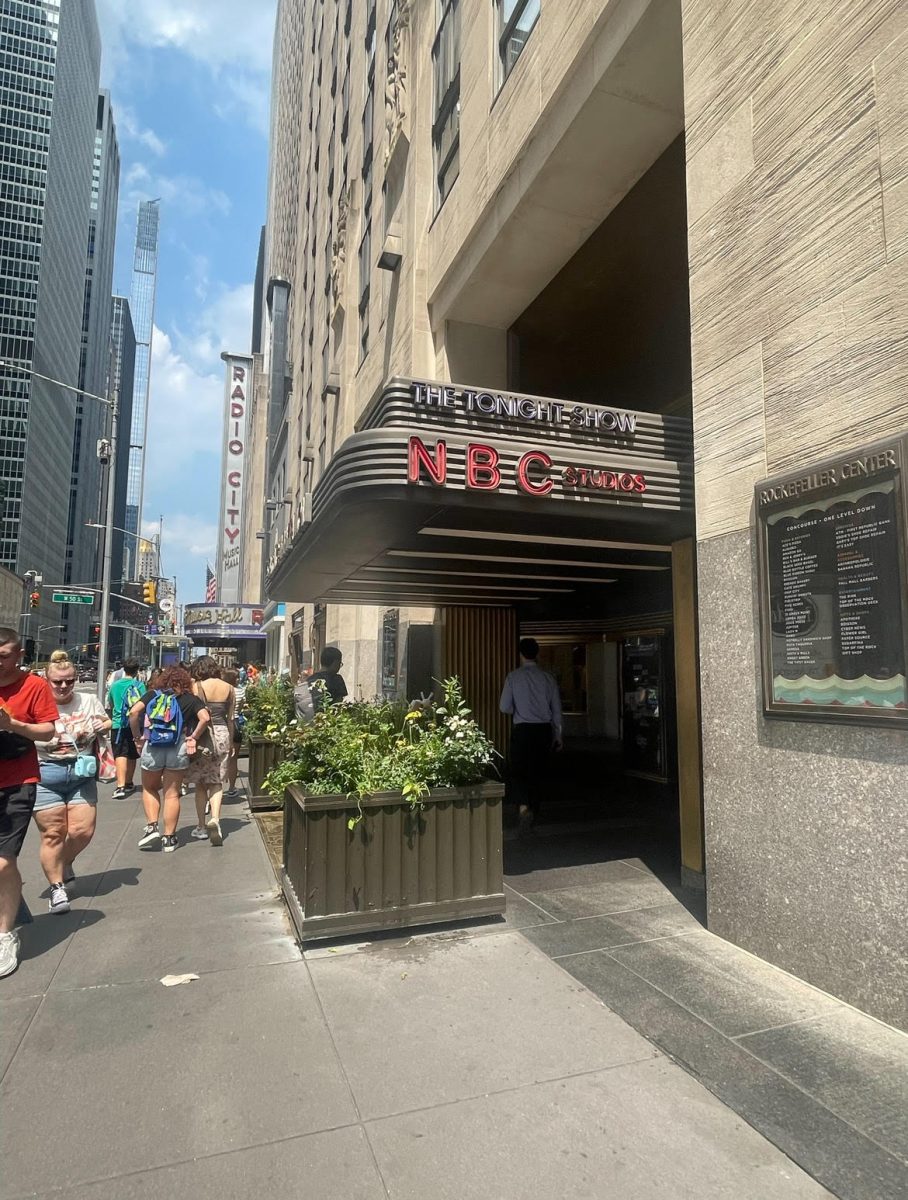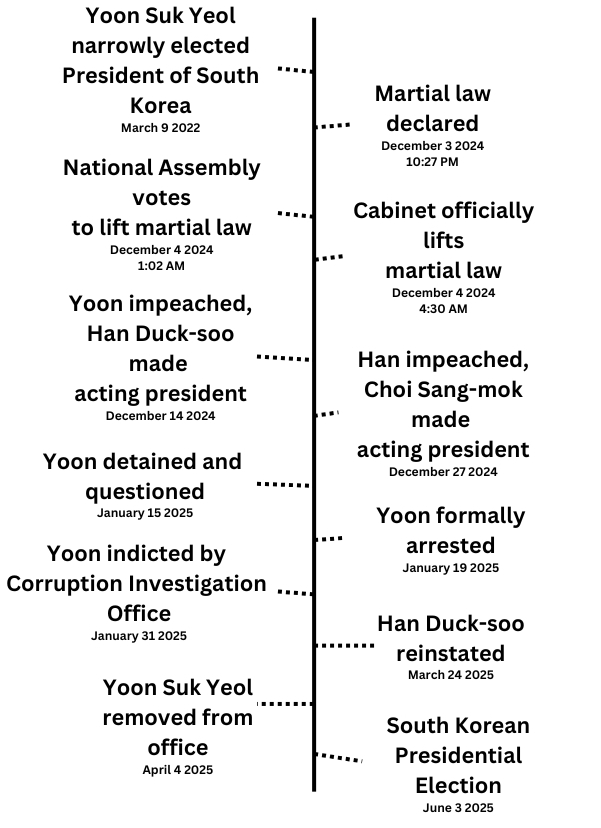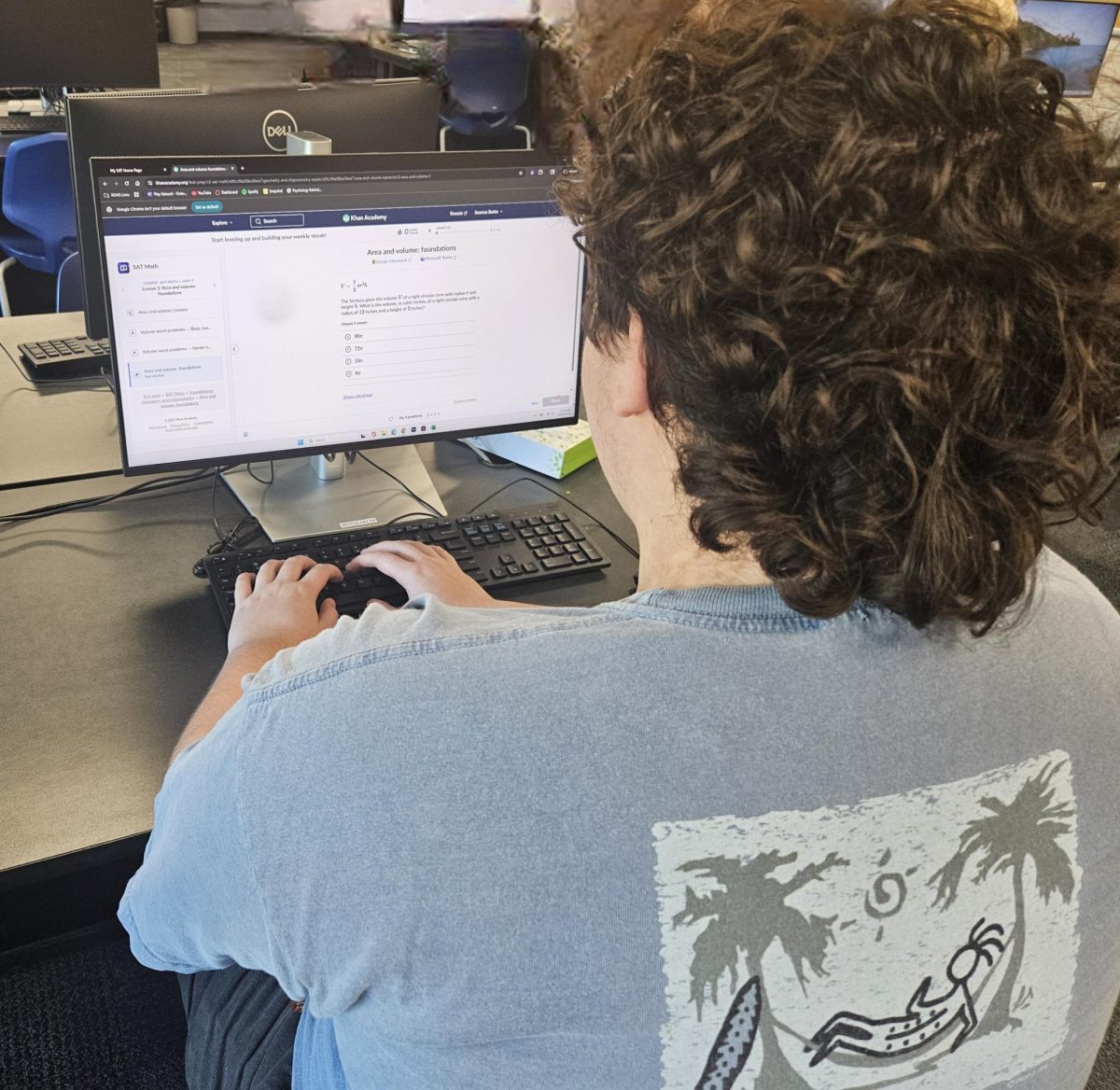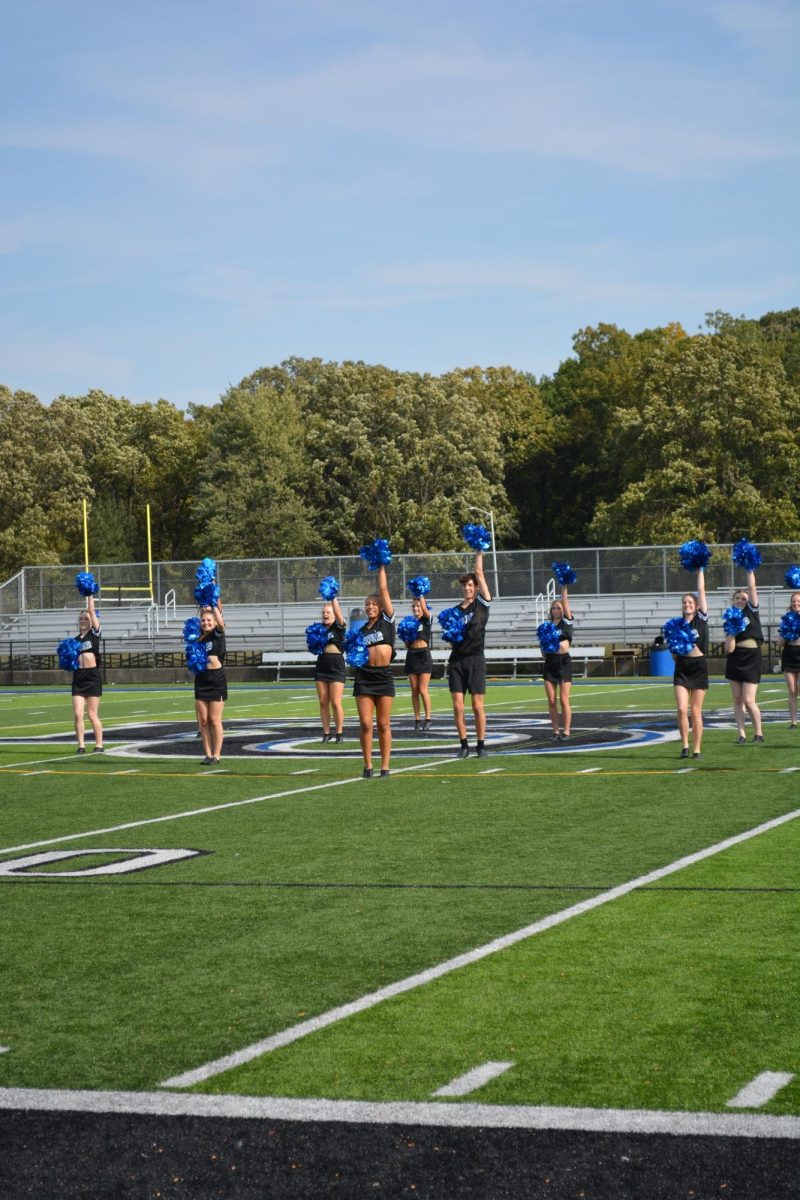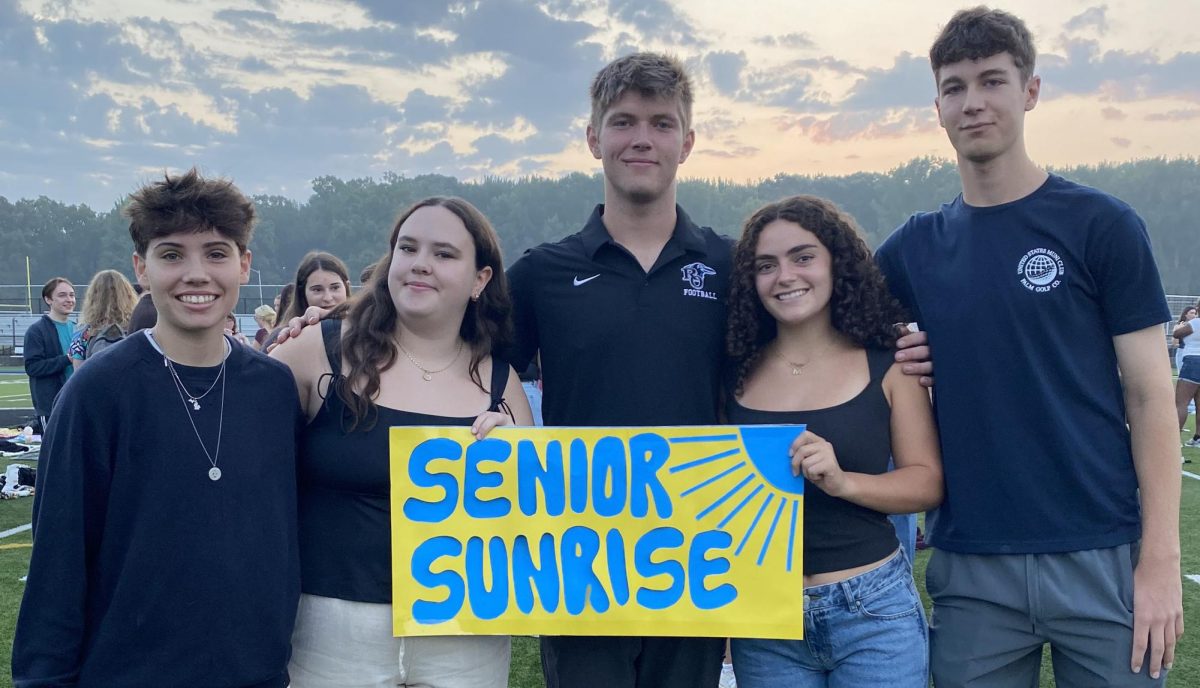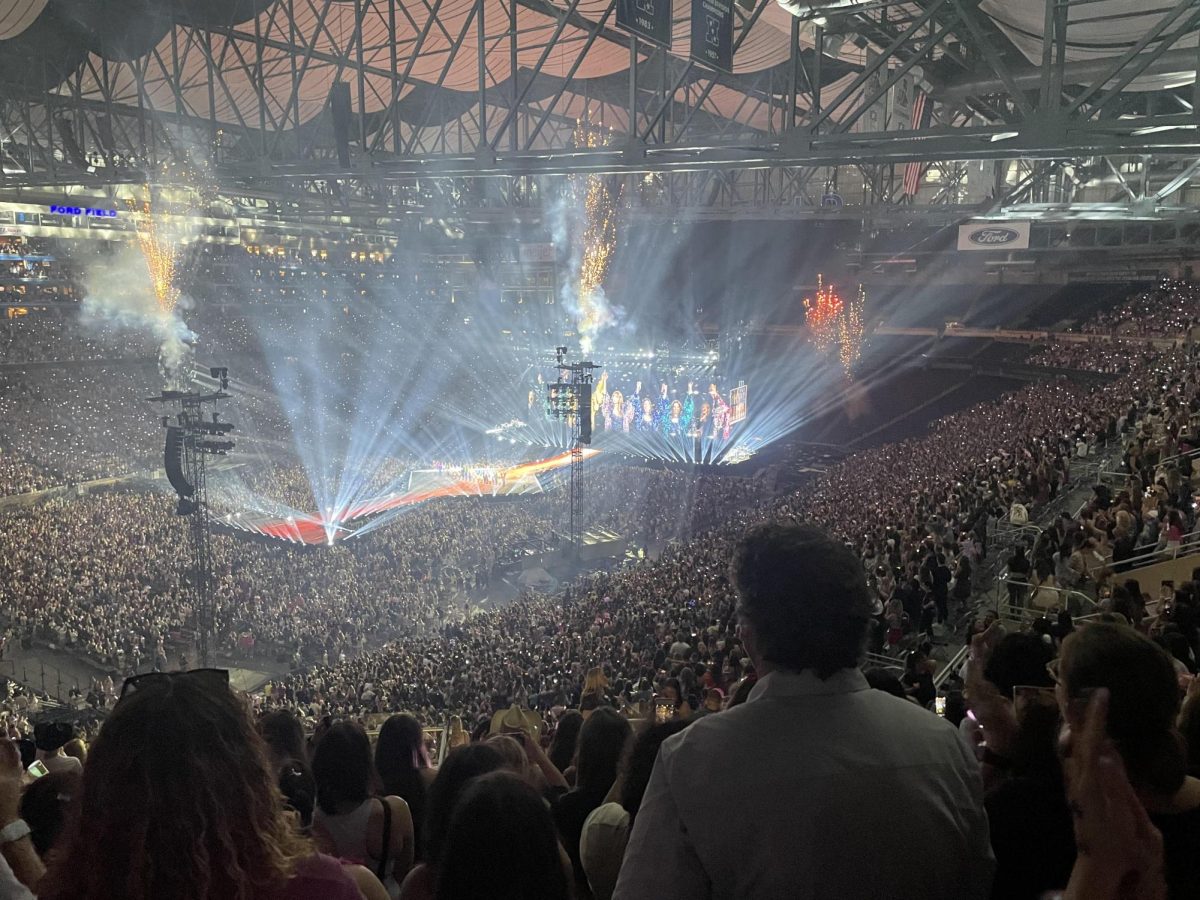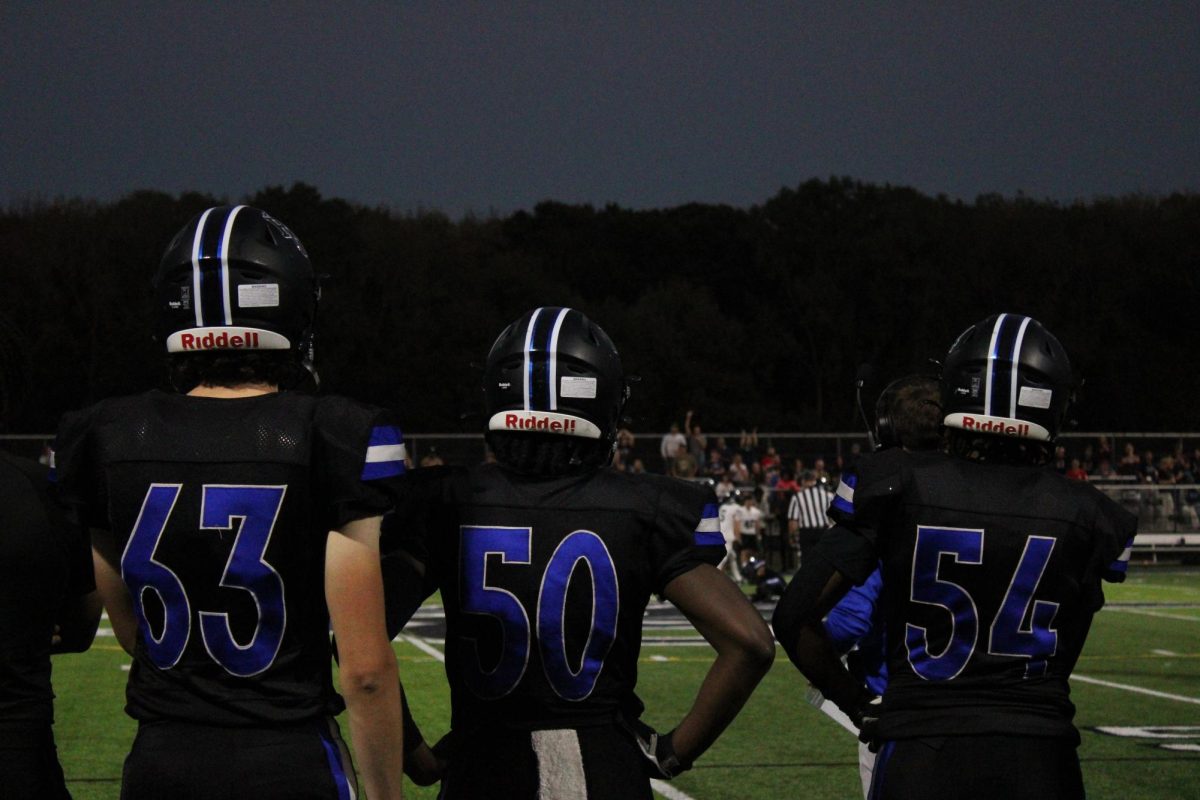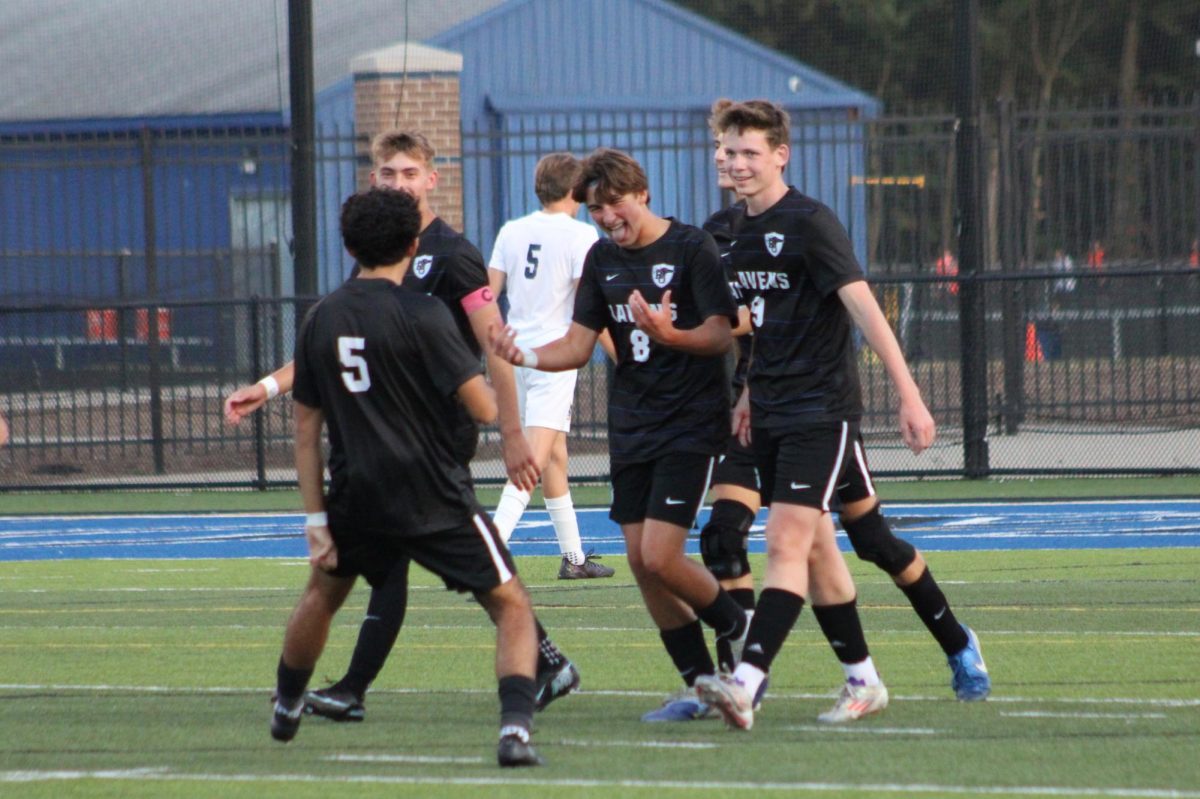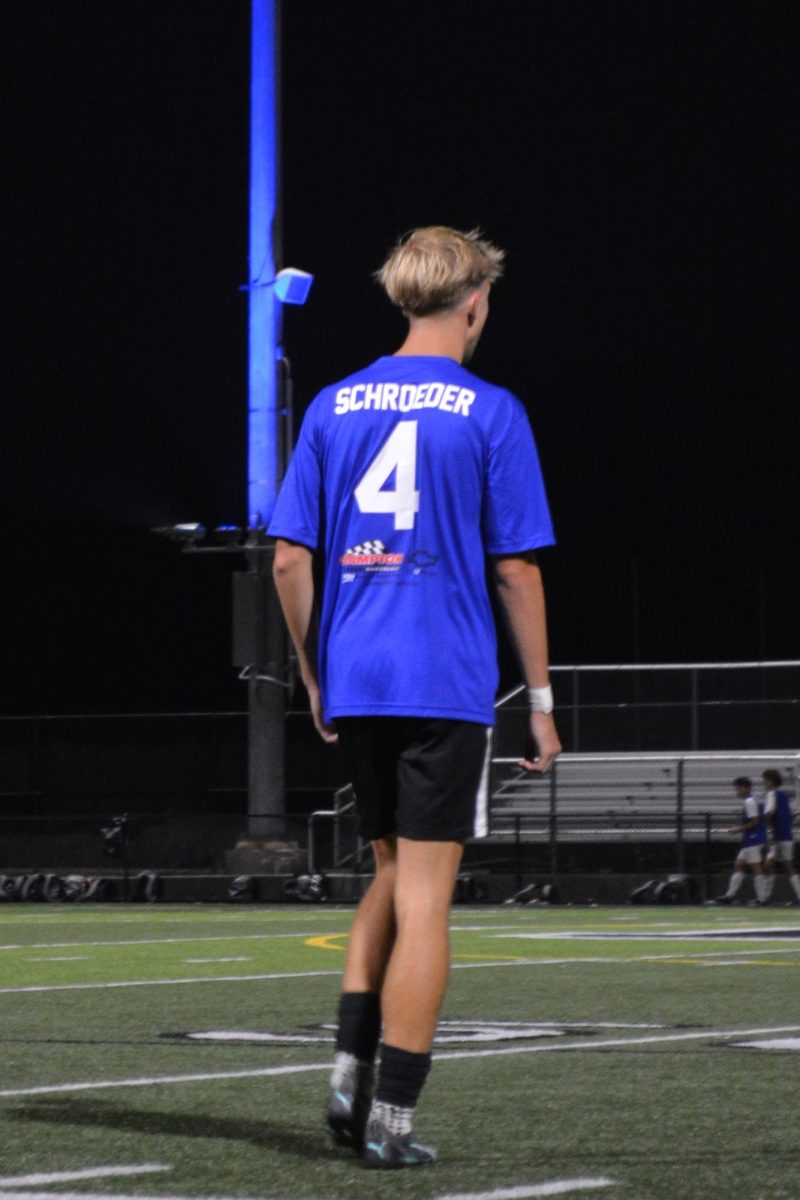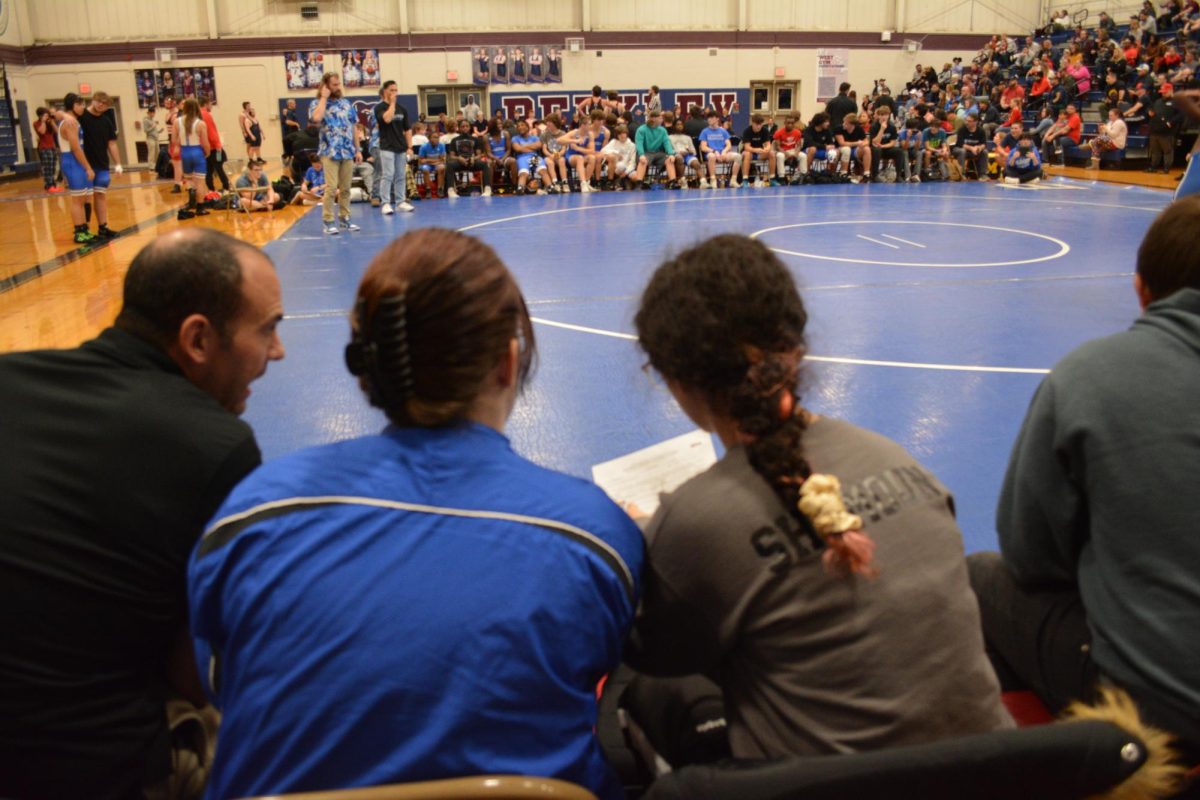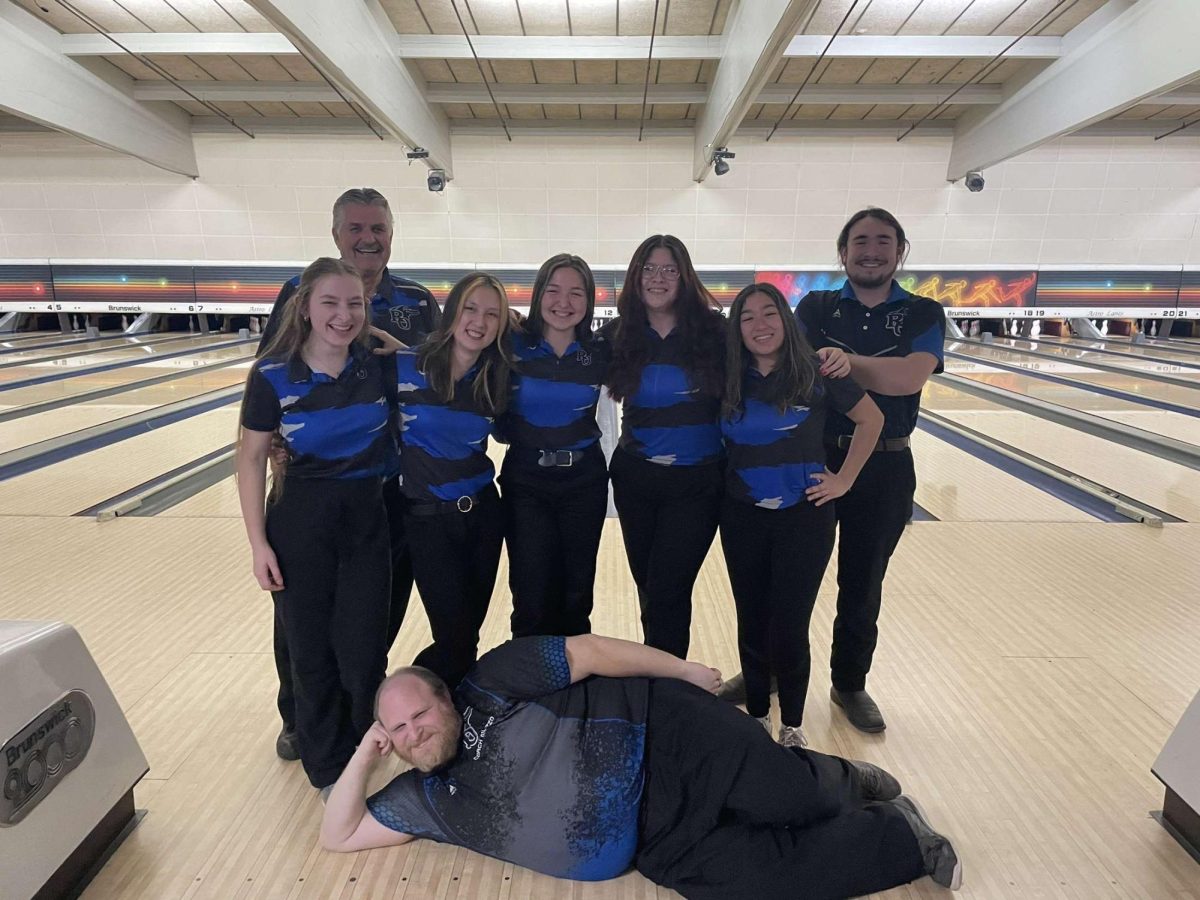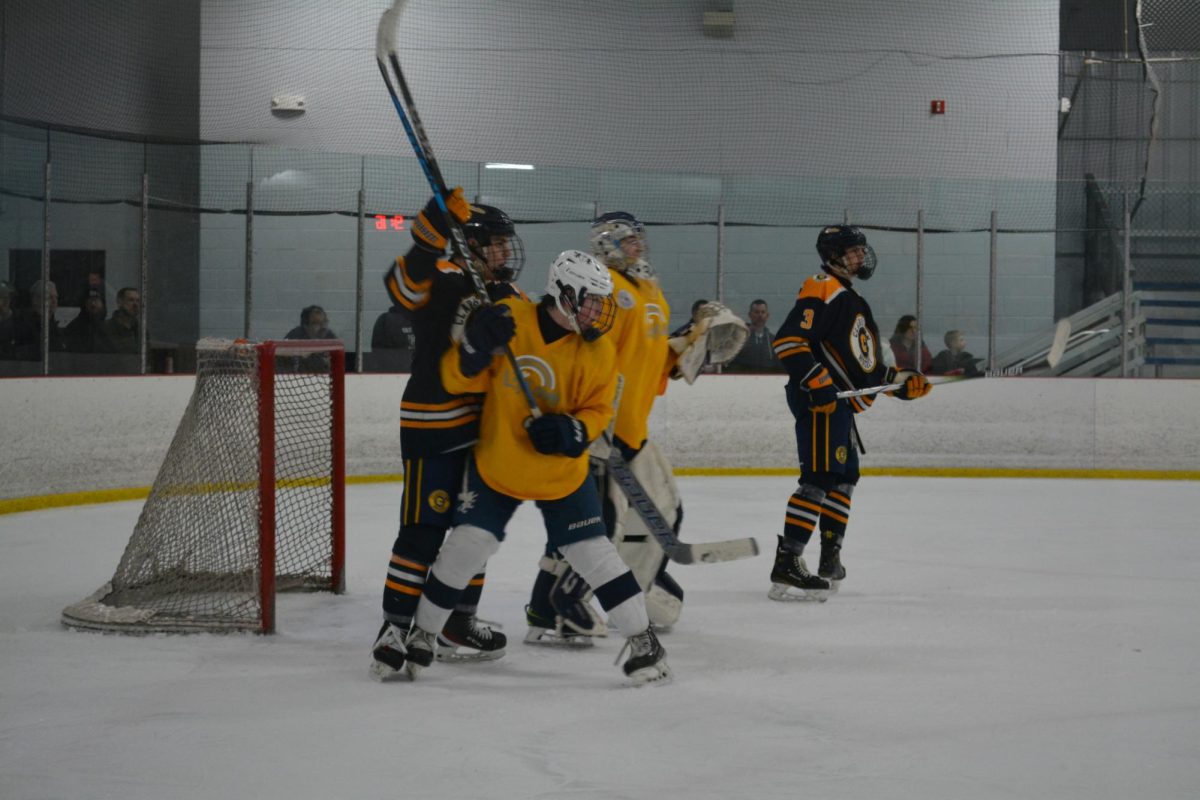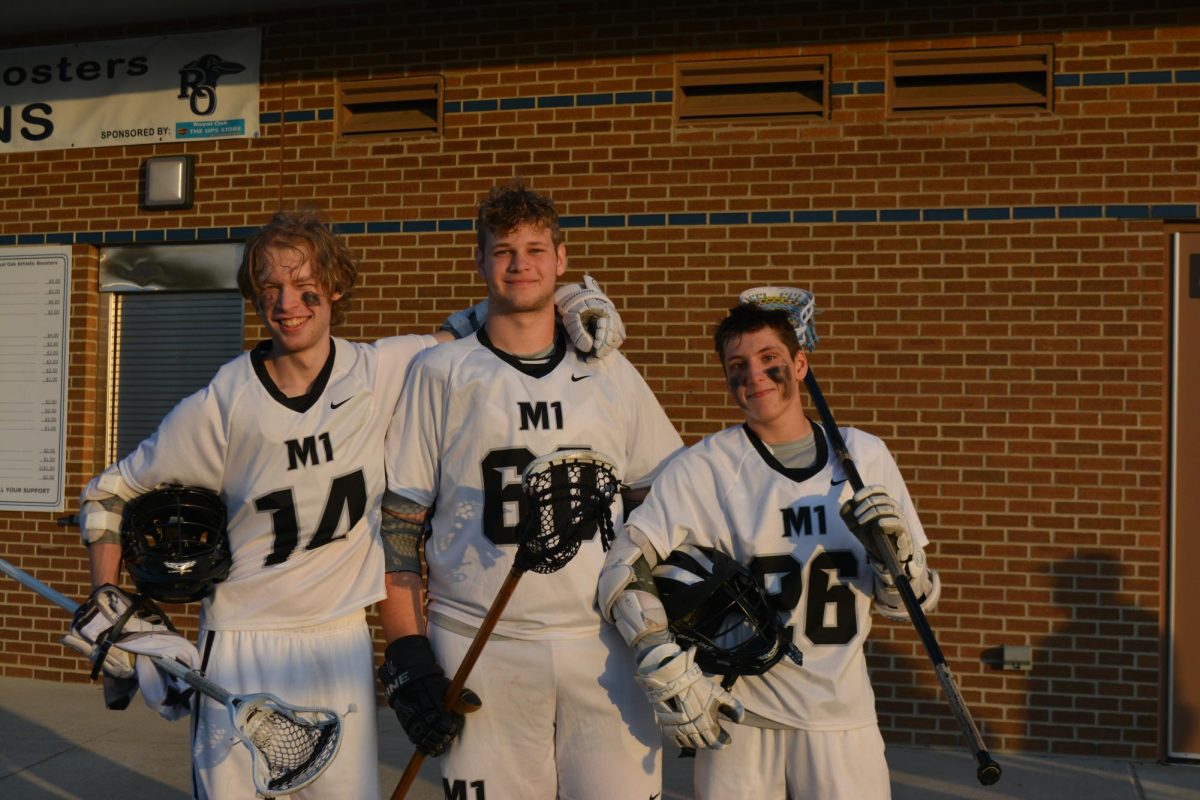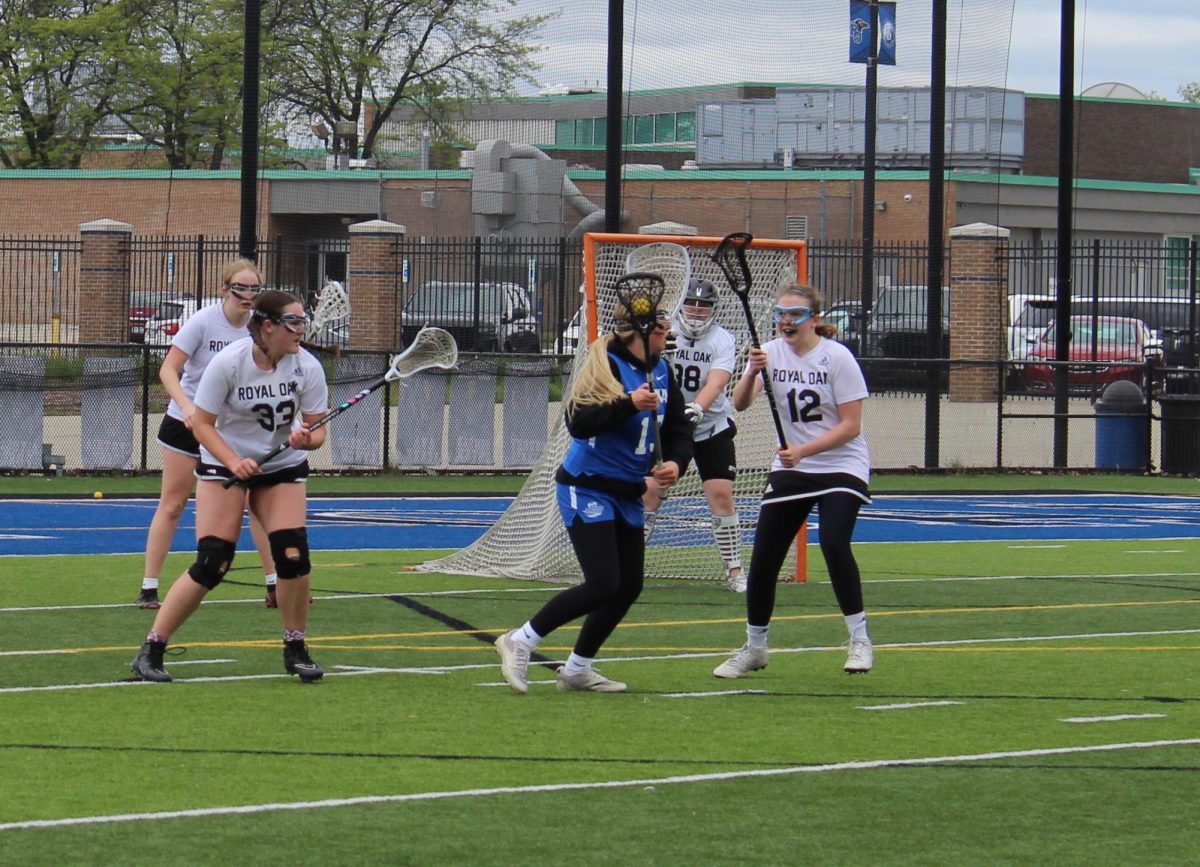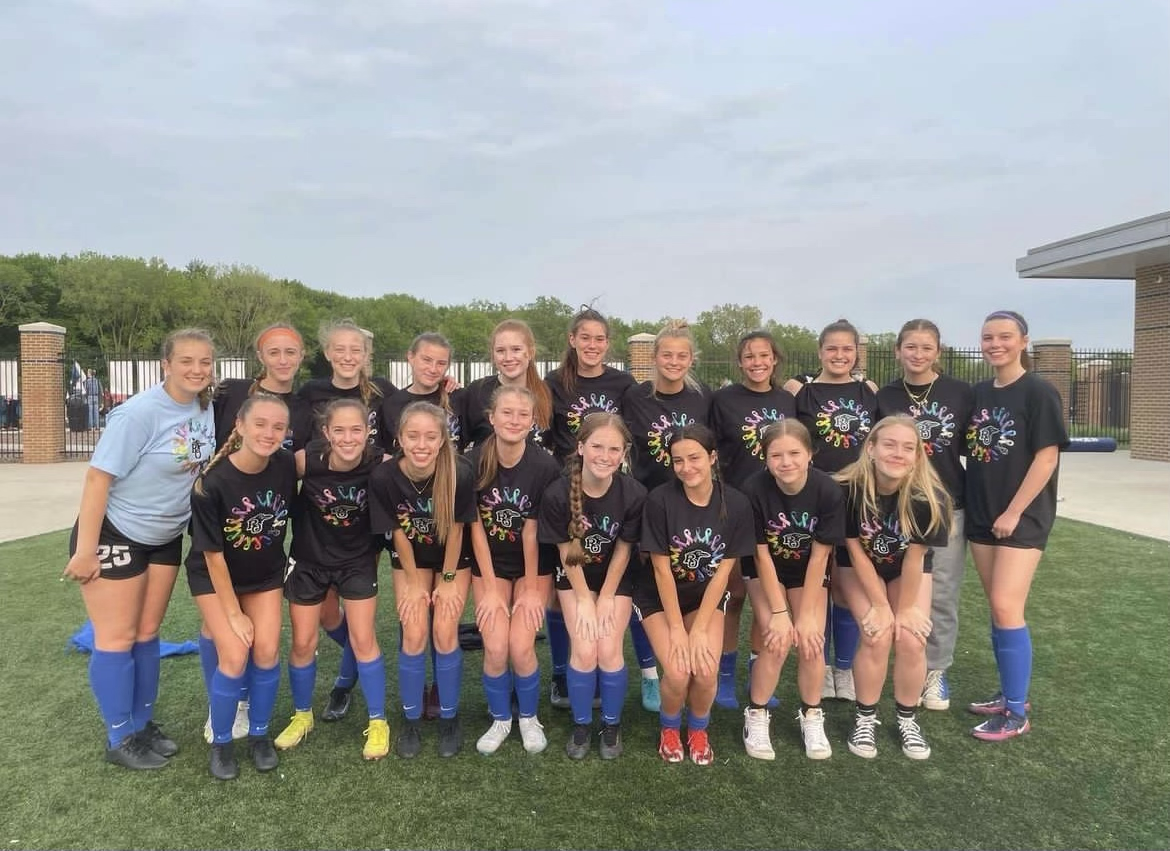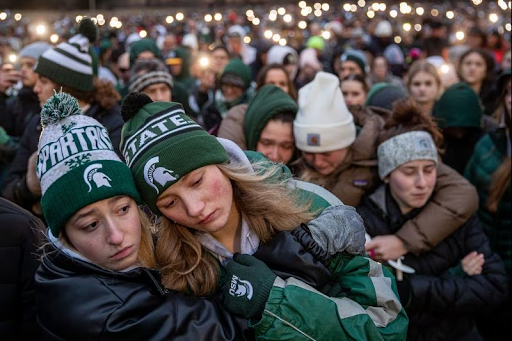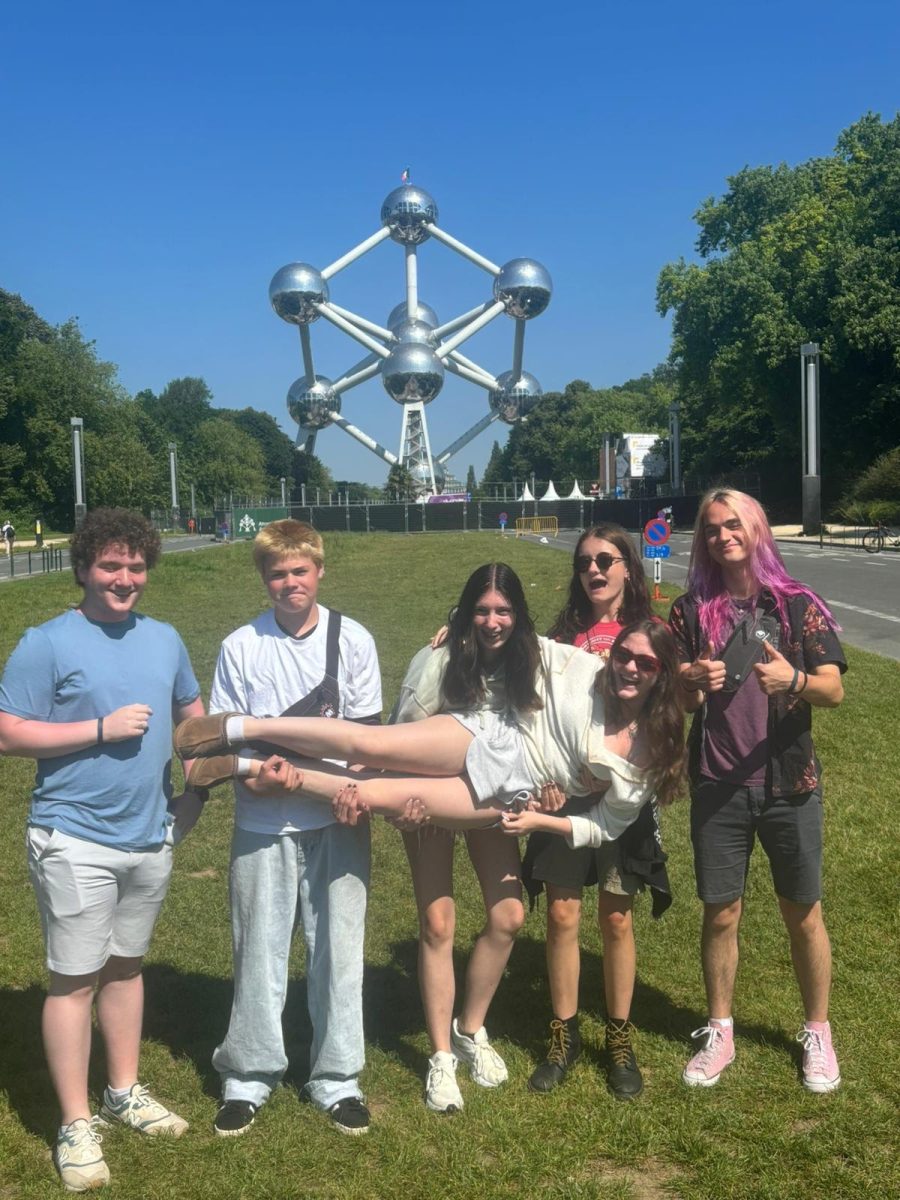Only fourteen months after the senseless tragedy at Oxford High School, another act of gun violence hit Michigan on Monday, February 13th, when Michigan State University became the site of a mass shooting. Three victims were killed, while five more were left in critical condition. Students and staff sheltered in place for hours before the suspect took his own life. People from all around the community gathered to commemorate the loss of the three victims: Arielle Anderson and Brian Fraser of Grosse Pointe, and Alexandria Verner of Clawson. College rivalries were put aside as people came together to ask a familiar question: When will it be enough?
ROHS Class of 2020 graduate Elle Fromm lives in East Lansing, and is currently taking a gap year in her studies, but spent the past two years as a student at MSU. Michigan State is her home. East Lansing is her home, and that home was violated by another occurrence of senseless gun violence.
What was seemingly a regular night on campus, Fromm and two of her friends were at her apartment watching “The Bachelor.” After her two friends – both MSU students – received an email alert, the night began to shift. Although the alert didn’t register right away in her mind, Fromm began to receive multiple messages from people in all walks of her life.
“I started getting a lot of text messages from other students, people in East Lansing, friends and family. My aunt was the first one,” said Fromm. “It was kind of one of those ‘everyone you’ve ever met’ situations. That’s when it kind of hit me like, ‘Oh, something is very wrong.’”
Initial shots were fired by the suspect at Berkey Hall, which was a mile away from Fromm’s apartment. She explained how sheer panic took over, and how the complete confusion surrounding the motive ignited a feeling of being “absolutely terrified.” Throughout the interview, Fromm choked up when speaking about her emotions.
“I was petrified and shocked. Just hollow,” she said. “I just thought, ‘Of course this would happen, because this is just what happens here. There are mass shootings all the time and people die from gun violence and this doesn’t happen anywhere else.’ When panic sets in, you can’t think like that. You don’t think logically. You feel fear, and I couldn’t stop. I was terrified, angry, and confused.”
Fromm has experienced trauma responses since the shooting. Faint noises and sirens are just some of the triggers that prompt her to have panic attacks where she is “not able to breathe” and feels “her chest hurting.” Fromm explained that her apartment is near the fire station, and every time she heard a siren from the department, that hyperawareness of her surroundings was only amplified. When one of her panic attacks was triggered, Fromm decided to call the CAPS (Counseling and Psychiatric Services) hotline offered at MSU. But she also felt conflicted.
“I felt so guilty feeling traumatized,” she said. “I had such shame because I felt like I wasn’t allowed. I told the woman on the phone that ‘I’m supposed to be fine.’ She responded, ‘No one is fine. Just because you weren’t in the room doesn’t mean this won’t affect you.’ That was something I really needed to hear.”
Fromm went on to explain that although the validation was important for her to hear, it is something that others should remind themselves of. A tragedy like the one at MSU is something that no one can prepare for, and people deal with it in a variety of ways. No two responses are exactly the same.
“This has been my biggest takeaway: There is no criteria you have to meet for being traumatized. It doesn’t matter how close you are. It doesn’t matter if you heard the shots [or] if you heard the sirens. Anyone could be affected by this,” said Fromm. While the shooting occurred on the MSU campus, many families anxiously sat at home, hoping to hear news from their loved ones. ROHS junior Lucie Coburn and sophomore Mary Coburn are the sisters of ROHS Class of 2022 graduate David Coburn, now a freshman at MSU. David was heavily involved in clubs and activities at ROHS, serving as student council president, and as a member of multiple sports teams.
Lucie recalled the night of the shooting, and how she handled the news.
“We first heard about it through David -it’s not like we saw the news- and then began to text and call him. He texted us, which was a relief,” she said.
Younger sister Mary was the first to read her brother’s text. Which was unsettling.
“I was the first one to see [the text] in my family, so I went and told the rest of them. [David] just sent a message saying that he was okay, and explained what was going on. I couldn’t really sleep that night, so I spent a lot of time just on the couch doing my homework while the news was on,” she said.
Both sisters talked about shifts in perspective, and how the tragedy intensified their bond with their brother.
“[The shooting] changed my perspective on things; to be thankful for any time I get to spend with anyone. I had thoughts of, ‘Is my brother okay?’ or ‘Is he going to stay okay?’ because we weren’t really sure where he was,” said Mary. “We didn’t call him because we didn’t want to cause a disturbance. We still textedHe explained that no one should ever trust the scanners, because when call volumes are high and situations are unfolding, information on the scanners cannot immediately be verified.
“[MSU’s] 9-1-1 center received over 2,400 phone calls during the incidents over the five-hour period. Of those, about 1,500 were 9-1-1 calls,” said Rozman. “It was absolutely overwhelming to look at the volume of calls we were receiving. We appreciate our community reaching out because every person that reached out thought they were experiencing something [whether it was] gunshots or [they] thought they saw the suspect. Every single one of those calls had to be processed and dispatched, and officers had to respond to confirm that there was no shooting.”
Rozman said people should always exercise caution when using information from police scanners. He also stressed that many people who reported that they saw suspects may have in fact seen off duty police officers.
“It wasn’t that people were trying to mislead us. Many thought they saw someone with a gun, and they reported it. Many of those people with guns were actually police officers because so many of us came from off-duty, so we didn’t have a uniform on. We threw a vest on, wearing jeans and tennis shoes, so a lot of the reports were actually people seeing police officers,” he said.
Rozman was clear that the scanners, while unable to filter out the false reports, can be credited as an important factor in the large scale response from officers. It helped keep law enforcement officers in contact with each another, ensuring that everyone stayed on page. Rozman advised that the public should never rely on information from anyone, or anything other than the police department.
Everyone in the MSU community has been affected deeply by the tragedy and is grieving in different ways. The DPPS is no different. Rozman said that the officers were offered opportunities to heal, and were encouraged to take advantage of these opportunities, some of which included therapy, support groups, or paid time off. Rozman explained that officers had to face an unimaginable situation, regardless of their duties. One opportunity that many of the officers had was attending the vigil held at MSU after the shooting. Rozman said that the officers were able to be present during the event, and given the opportunity to mourn with their community.
“It really was us healing together. We asked the Michigan State Police to provide security for the vigils so our MSU officers could actually attend the event, which is unusual,” said Rozman. “We usually handle everything ourselves, but we took a break and asked another agency to handle that for us so we could grieve with the community.”
Rozman offered advice on mental preparedness being vital to successfully handling an active shooter incident.
“You can talk about techniques and ‘Run, hide, fight,’ but you have to be mentally prepared,” he said. “You have to think about worst case scenarios. You have to think about, ‘What am I going to do if this happens?’ For a lot of people, this is very hard because it’s triggering and it may bring out a range of emotions, but you have to be prepared.”
Rozman encouraged people to think proactively and make a plan about what to do in case of an emergency.
“Most people freeze during a traumatic event. They don’t even know what to do,” he said. “You need to be able to overcome the fear, adrenaline, and use that to act. If you know what you are going to do beforehand, it makes it much easier to do so.” Jack Armstrong, ROHS Class of 2020 graduate, is a current junior at MSU. He was spending his night on the 13th doing homework at his apartment, before receiving a text that would leave a large mark on his college experience.
“I got a message from a group chat that said, ‘Active shooter at the Union.’ I was shocked. I went out into my living room to talk to my roommates. We had just assumed it was an off campus ordeal. We all got the notification [from the school] which made us think, ‘Oh, this is clearly different.’”
Armstrong’s response moved from shock into action.
“The shock turned into thoughts of, ‘This could be people that we know. This is a campus that we live on. This is different from someone running into some trouble downtown in an isolated incident. This is a serious, on-campus problem,’” he said.
Armstrong began connecting with friends and loved ones.
“The thoughts stemmed from fear,” he said. “When I was in my apartment, it was pretty much an endless cycle of texting different people. I would text my family any time I had heard an update; then I would go to my friends and text them. I had a friend who was in the engineering building, which was in lockdown, and he was alone. I was pretty much just cycling through my contacts, asking people how they were doing. “Armstrong lives about a mile off of campus. To stay current on the information being shared, he and his roommates listened to the police scanner. Armstrong talked about how he was never fully sure of what was going on, due to inaccurate information being shared through the outlet.
“We all had thought that there were several buildings where shots were fired, yet in reality, there were only two,” he said. “We were honestly convinced that during the whole thing, [the suspect] was multiple people. We only realized that it was actually a single person until the shooting was close to over. In the forefront of my mind, there were thoughts and feelings of, ‘When is this going to end? When are we going to figure out what’s actually going on? How bad is this going to get before it stops?’ It’s just a scary situation regardless if you’re far away.”
One of the ways that Armstrong found to move forward, despite the shock, was by trying to make things seem as “normal” as they could be. He acknowledges that the shooting has made him more aware of the language he uses in certain situations. As a journalism major, Armstrong takes photojournalism classes, where certain terms such as “shoot” are common. Phrases such as, “I am going to go shoot my roommate,” are common to use instead of, “I am going to go take some photos of my roommate.” He said that he notices himself hesitating to use some words, trying to be mindful of the fact that those statements may be triggering for others to hear. Ultimately, Armstrong looks to maintain his routines, and not let the tragedy get in the way of him being a college student.
“Personally, being on campus makes me feel better,” he said. “I wanted to come back. I wanted to get into my routine, because I felt like if I didn’t, I’d feel worse. I’ve been going to all of my classes because it makes me feel normal and having that routine- feeling like I’m still, at the end of the day, a college student.”
Armstrong has been moved by the way the MSU community has begun to heal in the wake of February 13th.
“The MSU community has come together in a really amazing way. It has made me love MSU even more, “ he said. “It was just great to see a place that I already love come together and be such a community. I was worried that something this traumatic would make people afraid to come back, and it would cause the campus to feel empty and lonely. I was happy to see that people were back on Monday, making each other feel as good as you can.”
Still, Armstrong has become more conscious about his surroundings, and explained that there are noticeable differences in his classes.
“I do notice that if I’m in a big lecture hall, or a large dining area, I am more alert to things that are going on around me,” he said. “One of my lecture halls is basically empty. It’s a 200 person class, and there’s an online option now. I showed up last week, and I think there were maybe seven to fifteen people in the room.”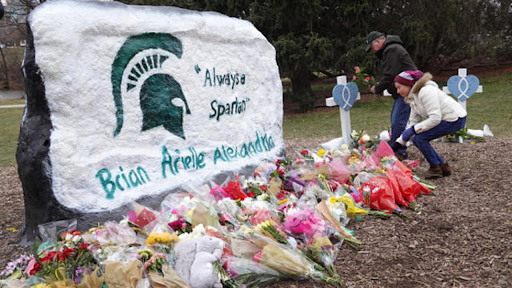
The tragedy that occurred at MSU is something that no one will be able to forget, no matter how hard they try. Instead of looking to try and shut out the memories, the community has focused on unity, and uplifting their fellow Spartans.
“I’m sure as I look back on my life, this will be one of the largest things I remember about my time here at MSU, which is sad. I was fortunate and lucky to not be directly affected by the tragedy, but I have friends who knew the victims. Even if you don’t know anyone, it’s still terrible- a loss of life that just doesn’t need to happen,” said Armstrong. “There is something to be said about watching a community come together. It really helps you feel better about the situation. Obviously, a horrible thing happened, but the response to the horrible thing is important too. It has made me realize how strong, and how interconnected the MSU community is. There is something unimaginable that happened that we will never be able to erase. As much as I love MSU, and as much as I will continue to make that my home for the next year, you’ll never be able to erase something like what happened. I don’t think we should try to erase it either. Everyone has to accept it, and it’ll be a part of our college experience forever. It’s upsetting, but we have to move forward together as a community.”
Every single person interviewed for this story graduated from Royal Oak Schools. Although six people are only a small fraction of individuals directly connected to the MSU shooting, people from the Royal Oak community are affected by gun violence and by this tragic incident. As the video cameras were packed up, and reporters left East Lansing, many residents were left to hold the shattered pieces, wondering how to put them back together. But the pieces can never be restored as if nothing happened. They will be bonded with scars – a constant reminder of the tragedy that rocked the MSU community and our students, past and present . Let this be a reminder that just because the media has left doesn’t mean emotions have left. Michigan State will heal and its community will focus on the future, but not without that lingering question: When will it be enough?

